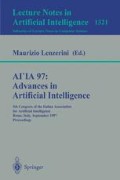Abstract
This paper proposes an uniform framework for the proof theory of tractable approximations of propositional reasoning. The key idea is the introduction of approximate proofs. This makes possible the development of an approximating sequent calculus for propositional deduction where proofs can be sound, complete or multi-directional approximations of classical logic. We show how this calculus subsumes existing approaches to approximation such as the BCP - k family of anytime reasoners by Dalal and S - 1, S - 3 entailments by Cadoli and Schaerf.
Preview
Unable to display preview. Download preview PDF.
References
A. Anderson and N. Belnap. Entailment: the Logic of Relevance and Necessity. Princeton University Press, Princeton, NJ, 1975.
G. Ausiello, P. Crescenzi, and M. Protasi. Approximate solution of NP optimization problems. Theor. Comp. Sci., 150(1):1–55, 1995.
S. Bellantoni, T. Pitassi, and A. Urquhart. Approximation and small-depth frege proofs. SIAM J. of Computing, 21(6):1161–1179, 1992.
M. Cadoli. Tractable Reasoning in Artificial Intelligence, volume 941 of Lecture Notes in Artificial Intelligence. Springer-Verlag, 1995.
L. J. Claesen, editor. Formal VLSI Correctness Verification: VLSI Design Methods, volume II. Elsevier Sci. Publishers (North-Holland), Amsterdam, 1990.
M. Dalal. Anytime families of tractable propositional reasoners. In International Symposium on Artificial Intelligence and Mathematics AI/MATH-96, pages 42–45, 1996. Extended version submitted to Annals of Mathematics and Artificial Intelligence.
M. Dalal. Semantics of an anytime family of reasoners. In Proc. of the 12th Eur. Conf. on Artificial Intelligence (ECAI-96), pages 360–364. John Wiley Sons, 1996.
M. Dalal and D. W. Etherington. Tractable approximate deduction using limited vocabularies. In Proceeding of the 9th Canadian Conference on Artificial Intelligence (AI-92), pages 206–221, 1992.
N. J. Fisher and R. E. Ladner. Propositional dynamic logic of regular programs. J. of Comp. and System Sci., 18:194–211, 1979.
R. Hähnle. Automated Deduction in Multiple-Valued Logics, volume 10 of International Series of Monographs on Computer Science. Oxford University Press, 1994.
J. Y. Halpern and Y. Moses. A guide to completeness and complexity for modal logics of knowledge and belief. Artificial Intelligence, 54:319–379, 1992.
J. Y. Halpern and M. Y. Vardi. Model checking vs. theorem proving: A manifesto. In J. Allen, R. Fikes, and E. Sandewall, editors, Proc. of the 2nd Int. Conf. on the Principles of Knowledge Representation and Reasoning (KR-91), 1991.
D. S. Johnson and M. R. Garey. Computers and Inctractability: A Guide to the Theory of NP-Completeness. Freeman, S. Francisco, 1979.
H. Kautz and B. Selman. Planning as satisfiability. In Proc. of the 10th Eur. Conf. on Artificial Intelligence (ECAI-92), pages 359–363. John Wiley & Sons, 1992.
H. J. Levesque. A logic of implicit and explicit belief. In Proc. of the 4th Nat. Conf. on Artificial Intelligence (AAAI-84), pages 198–202, 1984.
H. J. Levesque. Logic and the complexity of reasoning. J. of Philosophical Logic, 17:355–389, 1988.
S. Micali. CS proofs (extended abstract). In Proc. of the 35th Annual Symp. on the Found. of Comp. Sci. (FOCS-94), pages 436–453. IEEE Comp. Society Press, 1994.
D. Mundici. Satisfiability in many-valued sentential logic is NP-complete. Theor. Comp. Sci., 52(1–2):145–153, 1987.
N. Olivetti. Tableaux and sequent calculus for minimal entailment. J. of Automated Reasoning, 9:99–139, 1992.
S. Russel and S. Zilberstein. Composing real-time systems. In Proc. of the 12th Int. Joint Conf. on Artificial Intelligence (IJCAI-91), pages 212–217, 1991.
M. Schaerf and M. Cadoli. Tractable reasoning via approximation. Artificial Intelligence, 74:1–62, 1995.
B. Selman and H. Kautz. Knowledge compilation and theory approximation. J. of the ACM, 43(2):193–224, 1996.
R. M. Smullyan. First Order Logic. Springer-Verlag, 1968. Republished by Dover, New York, in 1995.
M. Szabo, editor. The collected papers of G. Gentzen. North-Holland Publ. Co., Amsterdam, Amsterdam, 1969.
A. Urquhart. The complexity of propositional proofs. The Bulletin of Symbolic Logic, 1(4):425–467, Dec 1995.
H. Wang. Towards mechanical mathematics. IBM Journal for Research and Development, 4:2–22, 1960.
M. Ying. A logic for approximate reasoning. J. of Symbolic Logic, 59(3):830–837, 1994.
Author information
Authors and Affiliations
Editor information
Rights and permissions
Copyright information
© 1997 Springer-Verlag Berlin Heidelberg
About this paper
Cite this paper
Massacci, F. (1997). A proof theory for tractable approximations of propositional reasoning. In: Lenzerini, M. (eds) AI*IA 97: Advances in Artificial Intelligence. AI*IA 1997. Lecture Notes in Computer Science, vol 1321. Springer, Berlin, Heidelberg. https://doi.org/10.1007/3-540-63576-9_110
Download citation
DOI: https://doi.org/10.1007/3-540-63576-9_110
Published:
Publisher Name: Springer, Berlin, Heidelberg
Print ISBN: 978-3-540-63576-5
Online ISBN: 978-3-540-69601-8
eBook Packages: Springer Book Archive

